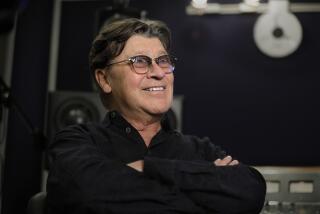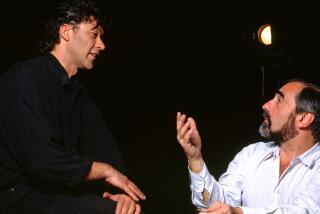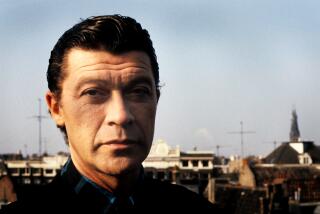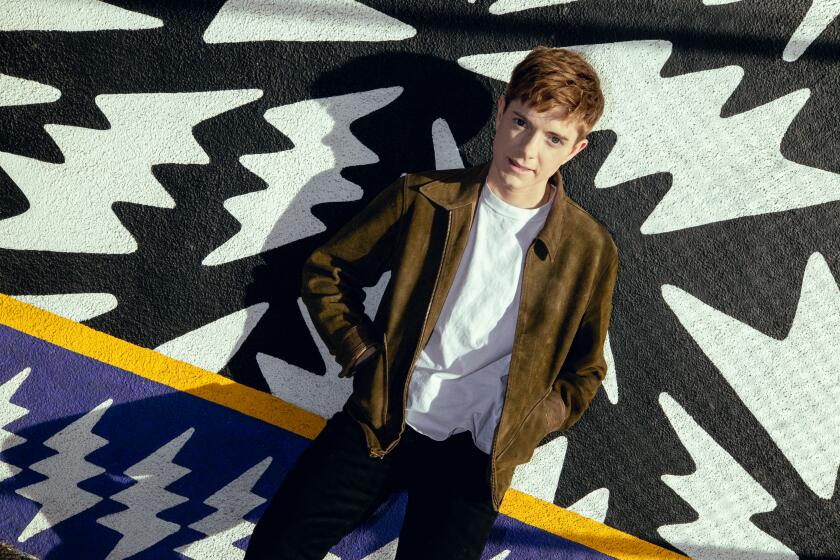Ruby Braff, 75; Jazz Trumpeter Known for Melodic Improvisations
- Share via
Ruby Braff, a trumpeter and cornetist who was considered one of the most melodic improvisers in jazz, has died. He was 75.
A resident of Harwich, Mass., on Cape Cod, Braff died Sunday at a nursing facility in nearby North Chatham. The cause of death was chronic lung disease.
Braff’s health took a turn for the worse last summer during a demanding tour of Britain, which he was forced to curtail. Critics there said that, health woes aside, he was playing near the top of his form.
Braff came to prominence in the 1950s as much of the jazz world was embracing the new sounds of bebop put forth by trumpeters like Dizzy Gillespie.
Braff played in a more traditional mode, embracing the style, if not quite the sound, of Louis Armstrong and Bix Beiderbecke.
“He had a great lyrical style and a nice soulful tone,” said Charles Champlin, arts editor emeritus of The Times, about Braff. “He also had a wonderful improvisatory sense. He was inventing melodies on top of the melodies as he was playing.”
The mostly self-taught Braff would say throughout his career that Armstrong was his only real influence.
“All of us studied with Louis,” he said, “and none of us ever graduated.”
Reuben Braff was born in Boston to Russian immigrant parents. As a boy he was interested in playing the saxophone, but his parents bought him a trumpet instead. Braff learned by playing along with what was on the radio.
An indifferent student, he once said music probably saved him from a life of menial jobs. He began listening to jazz at the age of 15 and was immediately drawn to Armstrong’s style of playing.
Jazz critic Nat Hentoff, who knew Braff growing up in Boston, recalled that Braff was playing very well even as a teenager.
“Ruby was playing at Izzy Ort’s, a dive next door to the RKO Theater in Boston,” Hentoff recalled Tuesday. “Benny Goodman was playing at the RKO, and one night he slipped into Izzy’s to hear Ruby play and loved what he heard. He called Ruby’s mother and told her he wanted to take her son on the road, but she wouldn’t let him do it because he was still in high school.”
Braff’s first major work came as a sideman for clarinetist Edmund Hall in the late 1940s. He would later play with trombonist Vic Dickenson and another leading clarinetist, Pee Wee Russell.
Braff built a loyal following and played at the first Newport Jazz Festival in 1954, but he found work scarce through the rest of that decade. It was not that his playing was old-fashioned -- his work never sounded out of date -- but it seemed that the jazz world was closed off to the traditional, favoring instead the more modern sounds coming from such players as Gillespie and Miles Davis.
But by the early 1960s, jazz had become more inclusive of its traditional roots and players like Braff. He toured with the Newport All Stars and became a fixture on the jazz festival circuit.
In the 1970s, he was featured soloist with Tony Bennett and led a quartet with guitarist George Barnes.
Braff, who wrote infrequently, focused his attention on standards and made them an integral part of his performances.
“He brought musicianship to a new level,” Hentoff said. “Every note meant something to him. He could be very tough on members of the band who were not playing up to their ability.”
And he could be extremely pointed in his criticism of the state of the art.
“I hear marvelous instrumentalists playing thankless music that they were encouraged to write by business people,” Braff told Down Beat magazine in 1997. “Many are too inexperienced to write music of importance. They pay lip service to [Ellington and Armstrong] but fail to include them in their repertoire. There’s a lot of showing off.”
Over the years, Braff became less inclined toward live performance and more apt to add to his prolific list of recordings, which he made with prominent jazz players such as pianists Dick Hyman, Roger Kellaway and Ellis Larkins; guitarists Ed Bickert and Howard Alden; and saxophonist Scott Hamilton.
Braff last performed in Southern California at the Jazz Bakery in June 2001, playing with Kellaway. Times jazz critic Don Heckman wrote of that appearance, “Braff’s to-the-point improvisations, delivered with the warm tone and slight, emphatic quavers at the end of phrases that are his trademarks, remained firmly in touch with the spirit of the tunes.”
Braff is survived by a sister, Susan Atran, of Stoughton, Mass. A memorial service will be held today at the Stanetzky Memorial Chapel in Canton, Mass.
More to Read
The biggest entertainment stories
Get our big stories about Hollywood, film, television, music, arts, culture and more right in your inbox as soon as they publish.
You may occasionally receive promotional content from the Los Angeles Times.










